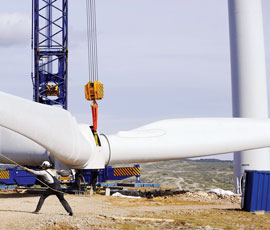Tips for getting energy project contracts right

One size simply does not fit all when it comes to contracts. Each is unique and it is important to seek advice to discover the legal and commercial pitfalls which a contract might contain.
Renewable energy projects are no exception. Before any investment is made, the key considerations of any contract include:
Who will be responsible for the condition of the site where the turbine or other process is to be installed? Who bears the risk and cost of ground conditions being different from those anticipated and who bears the cost of ascertaining what the ground conditions are?
In all cases this should be the contractor after appropriate site investigation.
Who will be responsible for access to the site? Who provides it and at whose cost?
Realistically this should be the landowner.
Who will be responsible for offloading the equipment?
This should be the contractor.
What is the proposed construction/delivery programme and timing? How does this fit in with the operation of the core farming or other business, for example, harvest?
The contractor should provide a comprehensive construction programme to ensure that the project fits in with the operation of the business, helping to ensure minimal impact.
What are the proposed payment terms in relation to the equipment or process?
Payment should be staged in return for the provision of actual work/progress and any advance should be secured by bank guarantee or bond.
Is the equipment or process certified for Ofgem (eg Microgeneration Certification Scheme or Renewables Obligation Certificates)? Will this certification be warranted?
The contractor should provide proof that the equipment is certified and warrant it to ensure the Feed in Tariff payment is secure.
What is the power curve (predicted power output under certain conditions) and is it to be warranted? If so, what conditions apply to the warranty?
Ideally the power curve should be a part of the contract and warranted by the contractor.
What is the availability of the machine or process and is that warranted?
Again the availability should be warranted as part of the contract by the contractor.
What is the warranty period and how does this relate to the payback period for the investment?
The warranty period should at least mirror the payback period.
What happens if there is down time?
Any down time should be compensated by agreed liquidated damages provided for in the contract. This would guarantee a set figure to cover income lost when equipment fails to operate through delay or fault.
What is the proposed liability period overall in the contract?
This needs to be as long as possible and commercially achievable. A liability period entitles the buyer to sue if the project does not operate as it should. This can be six years or 12 years depending on the type of agreement but ideally should match the payback period. It offers far more protection than the manufacturers’ warranty.
What is the proposed rectification period for any defects – is it reasonable?
This rectification period needs to reflect a short repair period over a long duration.
In the event that there is a lack of response to an equipment or process failure, what rights do you have to step in and rectify any defect and to charge that work to the manufacturer, supplier or installer. How do those rights impact any ongoing warranty?
Time means money. If it isn’t repaired you need to be able to step in to fix it and preserve the warranty.
What are the proposals for availability and performance guarantees and how is liability under this considered?
These need to be part of the contract and warranted by the contractor.
What are the proposals for maintenance and monitoring of the equipment?
A structured regime needs to be put in place.
What are the proposals for resolving any disputes which may arise in the course of the contract and the operation of the machine or process?
You need a quick, cost effective dispute resolution mechanism – relationships needs to be preserved. Mediation and expert determination are good options.
Who are you dealing with – what is the status of the proposed provider of the machine or process?
Make sure the other party is substantial in asset terms or supported by a company that is – if you have concerns, seek a guarantee from a parent company.
